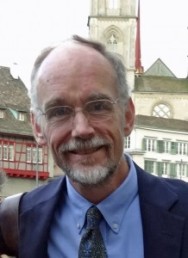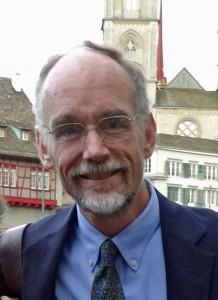 Karl Kirchwey is the author of six books of poems, most recently At the Palace of Jove (2002), The Happiness of This World: Poetry and Prose (2007) and Mount Lebanon (2011), and his poems have appeared in Agni, The Atlantic, The Hudson Review, The New Criterion, The New Republic, The New York Review of Books, and The New Yorker among others. He has translated poems from French, German, Italian and Spanish and received grants from the Ingram Merrill Foundation, the John Simon Guggenheim Memorial Foundation, and the National Endowment for the Arts. He currently serves as a Professor and Director of Creative Writing at Boston University.
Karl Kirchwey is the author of six books of poems, most recently At the Palace of Jove (2002), The Happiness of This World: Poetry and Prose (2007) and Mount Lebanon (2011), and his poems have appeared in Agni, The Atlantic, The Hudson Review, The New Criterion, The New Republic, The New York Review of Books, and The New Yorker among others. He has translated poems from French, German, Italian and Spanish and received grants from the Ingram Merrill Foundation, the John Simon Guggenheim Memorial Foundation, and the National Endowment for the Arts. He currently serves as a Professor and Director of Creative Writing at Boston University.
Robin Tung: What sets Boston University’s MFA program apart from other programs?
Karl Kircheway: The BU MFA Program in poetry and fiction is characterized not only by its excellent faculty, its emphasis both on creative writing and on literary study, and its Global Fellowship (allowing all students the chance to live, write and travel anywhere outside the United States) but also by its intensity and rigor, resulting from the fact that it is completed in one academic year, usually including summer study.
RT: What is funding like for this or next year?
KK: Accepted MFA students in poetry and fiction each receive full coverage of tuition and fees, basic health insurance, a stipend of $12,800 (usually requiring teaching), and a Global Fellowship of approximately $5000.
RT: How many students applied last year, and how many were accepted into each genre?
KK: For the 2015-16 class, 346 fiction writers applied for ten places; 129 poets applied for eight places, for a total of eighteen students out of 475 applications.
RT: What do you look for in a candidate?
KK: We look for writing talent first, but also the potential for growth, the desire to improve and learn, and the desire to contribute to the growth of others.
RT: What advice can you offer applicants during the application process?
KK: Think carefully about what you submit as your writing sample. Fiction faculty advises applicants to “write simply, directly, feelingly, and show us you can do it more than once.” Poetry students should present their strongest work, suggesting not only formal and stylistic range, but a genuine sensitivity to language. The personal statement is also very important, and allows faculty to get an idea of how the applicant will function in a small cohort committed to a demanding program.
RT: Have you come across any application blunders–or what not to do in an application?
KK: Ignoring the length limit for the writing sample is not a good idea: less is often more. Proofreading is important, as is being sure that the addresses and references in the application actually pertain to Boston University and not to another MFA program to which the candidate is applying.
RT: Are there stylistic or form leanings (traditional vs experimental, certain writers or texts taught each year)?
KK: We try to accommodate students working in a range of styles and voices, though there is no particular emphasis on the experimental.
RT: What texts and authors did you teach this year?
KK: In my fall MFA poetry workshop, I used a prosody anthology I have assembled over twenty years; in my spring workshop, students read and discussed single volumes of poetry by Sarah Arvio, Frank Bidart, David Ferry, Louise Gluck, Robert Hass, Seamus Heaney, Robert Pinsky and Mark Strand.
RT: What are you working on now?
KK: I have completed a seventh book, consisting of poems about Rome, where I lived from 2010-2013.
RT: What advice do you have for new writers?
KK: New writers must find a way to derive satisfaction from the hard labor of writing that is sufficient to compensate them for a great deal of isolation and rejection. Our hope is that the year spent at BU in the company of other poets and fiction writers will provide a supportive community as new writers continue this search.
